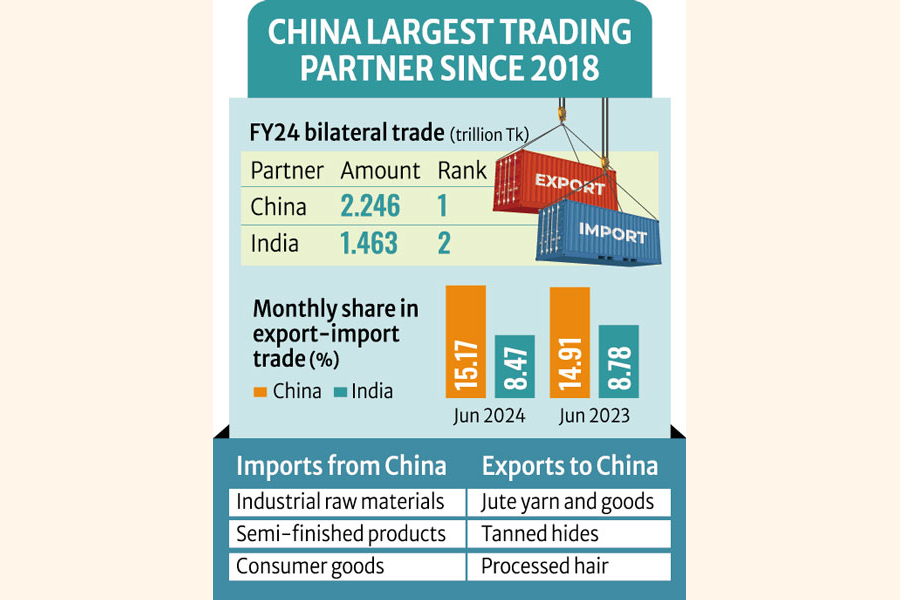
Published :
Updated :

China maintained its position as Bangladesh's largest trading partner in FY24, with bilateral trade amounting to Tk 2.246 trillion, according to data from the Bangladesh Bureau of Statistics (BBS).
India remained the second-largest trading partner, recording Tk 1.463 trillion in two-way trade during the same period, the data revealed.
China surpassed India in imports as early as 2010 and emerged as Bangladesh's largest trading partner in 2018, according to the Centre for Policy Dialogue (CPD). This growing relationship has been further strengthened by China's Belt and Road Initiative (BRI).
Besides, China's share in Bangladesh's total export-import trade increased to 15.17 per cent in June FY24, a rise of 0.26 percentage points from the previous fiscal year's same month, the BBS data released on Tuesday shows.
In contrast, India's share dropped to 8.47 per cent, down by 0.31 percentage points from the corresponding month a year earlier.
Bangladesh primarily imports industrial raw materials, semi-finished products, and consumer goods from China, while exporting items such as jute yarn, jute goods, tanned hides, and processed hair.
Dr Zahid Hussain, an independent economist, told The Financial Express Bangladesh heavily depends on China for industrialisation as most production-related goods are sourced from there.
He highlighted China's price competitiveness compared to other nations and noted that lower transportation costs due to geographic proximity further reduce the expenses of importing from China.
Dr M Masrur Reaz, chairman and chief executive officer of Policy Exchange Bangladesh, emphasised China's global price competitiveness makes it an attractive trading partner not just for Bangladesh but for many other countries as well.
"China is often referred to as the factory of the world, providing affordable industrial materials," he said.
Masrur added the relationship between Bangladeshi and Chinese entrepreneurs is characterised by trust and mutual benefits, which has further boosted trade.
"Chinese exporters often offer multiple incentives, including deferred payment options, to Bangladeshi importers," he noted.
He also mentioned China is currently experiencing deflation, prompting its factories to lower prices, which has led to a surge in Chinese exports globally.
Meanwhile, China, a global trade powerhouse, held a trade surplus with 174 countries and territories, including the US, as of 2022.
However, it has notable trade deficits with key economies. Its largest deficit is with Taiwan due to significant integrated circuit imports. Deficits with Japan (-$11.9 billion) and South Korea (-$37.8 billion) are largely attributed to electronics and machinery imports.
China also records trade deficits with oil-producing countries like Russia and Saudi Arabia as well as Australia, which supplies essential raw materials, such as iron, gold, lithium, and liquefied petroleum gas.
jasimharoon@yahoo.com


 For all latest news, follow The Financial Express Google News channel.
For all latest news, follow The Financial Express Google News channel.